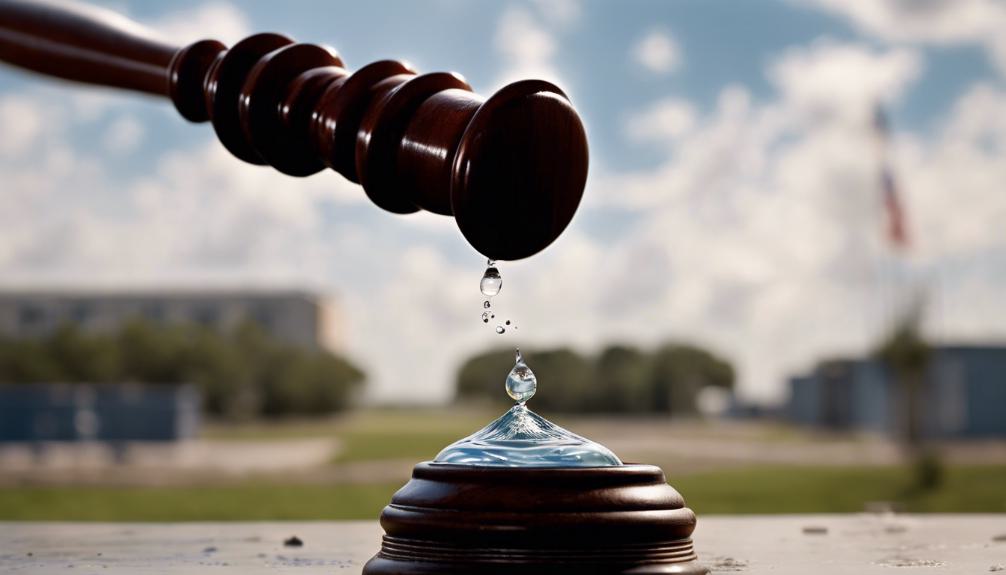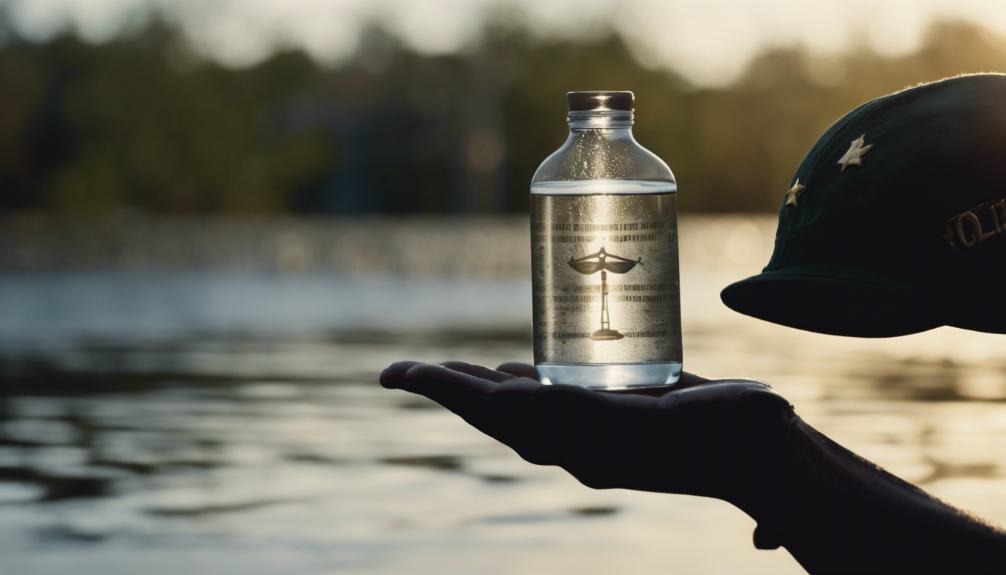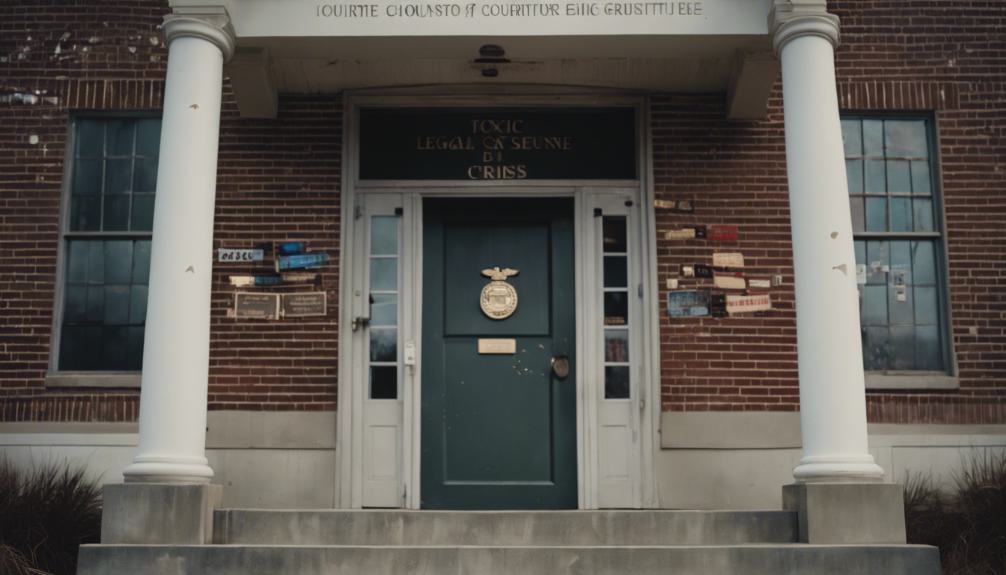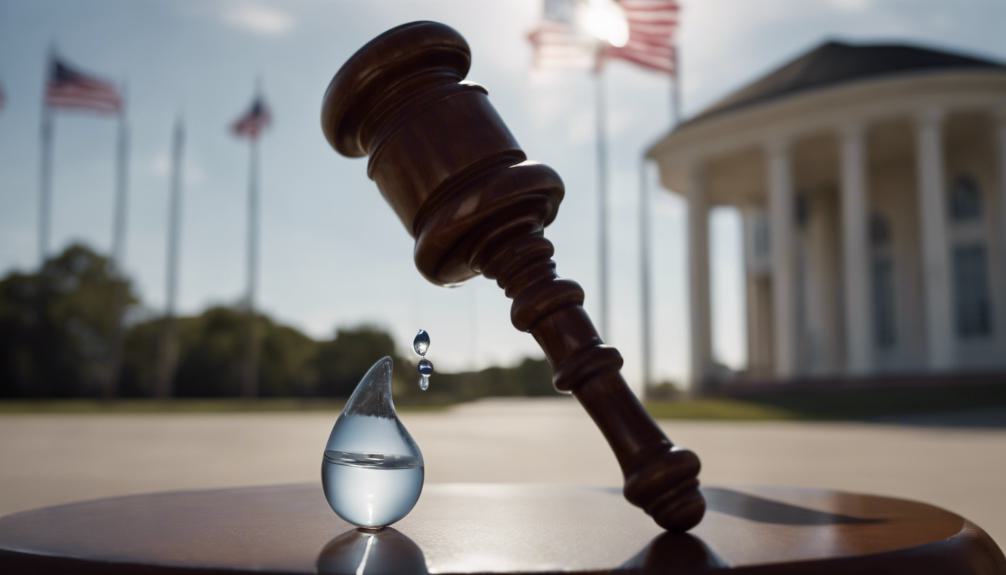Toxic Crisis at Camp Lejeune: Legal Battle
The legal battle surrounding the toxic water crisis at Camp Lejeune represents a seminal moment in the intersection of environmental health and military accountability. As legislation like the Camp Lejeune Justice Act moves through the corridors of power, promising a pathway to compensation for victims, the case opens a Pandora's box of questions about the extent of responsibility and the mechanisms of redress in instances of systemic exposure to environmental toxins. This unfolding narrative not only seeks to provide justice to those directly affected but also sets a precedent for how similar cases might be handled in the future, leaving one to ponder the broader implications for society at large.

Key Takeaways
- Up to 500,000 people were exposed to toxic water at Camp Lejeune over 30 years.
- Eligible victims include those exposed for at least 30 days from 1953 to 1987.
- The Camp Lejeune Justice Act, awaiting Senate approval, aims to compensate affected individuals.
- Approximately 1,100 lawsuits have been filed in North Carolina federal court seeking justice.
Historical Overview

The contamination of water at Camp Lejeune, spanning over three decades beginning in August 1953, exposed up to 500,000 individuals to harmful toxins, marking a significant environmental and health crisis within the United States military history. This tragic event underscores the paramount importance of vigilance and responsibility in managing environmental hazards, especially within communities dedicated to public service and national defense. The repercussions of this oversight have catalyzed a broader understanding of the critical need for stringent environmental safeguards and proactive health monitoring in military and civilian communities alike. As stewards of public trust and safety, the lessons learned from Camp Lejeune's water crisis serve as a solemn reminder of the enduring commitment required to protect the well-being of those who serve our nation.
Exposure Statistics

Reflecting on the historical overview of Camp Lejeune's water contamination underscores the magnitude of exposure, with up to 500,000 individuals affected over a span of three decades. This vast number represents a spectrum of military personnel, their families, and civilian workers whose lives were intertwined with the base's daily operations, unknowingly exposed to harmful toxins. The eligibility criteria for seeking compensation—residing or working at the base for at least 30 days between August 1, 1953, and December 31, 1987—highlight the broad impact of this crisis. This statistic is not just a number; it represents half a million stories of service and sacrifice, underscoring the urgent need for resolution and support for those impacted by this tragedy.
Health Impact

Amid the broad spectrum of those affected by the Camp Lejeune water contamination, significant health repercussions have emerged, including multiple forms of cancer and neurological disorders directly linked to the exposure. Victims and their families face not only the physical and emotional toll of these conditions but also the challenge of finding a complex path to seeking justice and compensation. It's important to recognize the depth of suffering behind the statistics; every case represents a life profoundly altered by circumstances beyond their control. For those committed to serving others, understanding these impacts is essential. It enables us to extend empathy, support, and advocacy to those whose lives have been upended. The journey toward healing and justice is arduous, but through collective efforts, there is hope for restitution and closure for the victims.
Legal Framework

Exploring the legal landscape surrounding the Camp Lejeune contaminated water crisis requires a thorough understanding of the legislative measures and judicial proceedings involved. The cornerstone of this legal framework is the Camp Lejeune Justice Act, part of the broader Honoring our PACT Act of 2021, which reflects a significant milestone in acknowledging and addressing the decades-long health crisis. This legislation enables affected veterans and their families to seek compensation through legal channels, marking a pivotal shift from previous barriers to justice. The Act's passage through the House with bipartisan support underscores a collective commitment to rectifying the wrongs suffered by as many as 500,000 individuals exposed to toxic water, setting a precedent for addressing similar environmental health crises.
Compensation Claims

Thousands of veterans and their families have initiated compensation claims following exposure to toxic water at Camp Lejeune, marking a pivotal phase in the fight for justice and restitution. This endeavor is aimed at addressing the long-standing suffering and health crises that have emerged due to the contaminated water supply at the base. With conditions ranging from multiple forms of cancer to neurological disorders directly linked to the exposure, the call for compensation underscores a critical step towards acknowledging and rectifying the hardships endured by those affected. The legal pursuit of these claims not only seeks to provide financial relief but also to serve as a form of recognition of the sacrifices made by military personnel and their families, reinforcing a commitment to their well-being and dignity.
Senate Deliberation

The Senate's examination of the Camp Lejeune Justice Act marks a critical juncture in addressing the long-standing issue of water contamination that has impacted countless veterans and their families. As this legislation progresses through the Senate, the deliberation phase represents a proof of hope for many who have long awaited acknowledgment and support. This period is instrumental in shaping the future of how the United States honors its commitment to those who have served. The Senate's careful consideration of the Act demonstrates a commitment to rectifying past oversights and ensuring that affected individuals receive the compensation and recognition they deserve. It is a evidence to the dedication towards serving those who have selflessly served the nation, highlighting a pivotal moment in legislative action for veterans' welfare.
Justice Act Details

Building on the Senate's deliberation, the Camp Lejeune Justice Act encompasses critical provisions aimed at addressing the historical water contamination issue at the military base. This legislation represents a significant step forward for veterans and their families who have suffered due to toxic exposure. It opens a pathway for those affected—estimated to be as many as 500,000 individuals—to seek compensation if they lived or were stationed at Camp Lejeune for at least 30 days between August 1953 and December 1987 and have since developed specific health issues. The Act aligns with a broader commitment to acknowledging and rectifying past oversights in military environmental safety, ensuring that those who dedicated their lives to serving their country receive the support and recognition they rightfully deserve.
Filing Lawsuits

Initiating legal action has become a crucial step for those affected by the contaminated water at Camp Lejeune, seeking justice and compensation for their suffering. With eligibility criteria specifying exposure to toxic water for at least 30 days between August 1953 and December 1987, and health issues including various forms of cancer and neurological disorders, the path to litigation is clear. The Camp Lejeune Justice Act has empowered individuals and families to file lawsuits against the U.S. Government. This process not only symbolizes the pursuit of accountability but also offers a beacon of hope for victims seeking redress for their grievances. Legal professionals dedicated to serving these communities are providing necessary guidance, ensuring that the affected parties are informed and supported throughout the complex legal journey.
Settlement Benefits

Eligible individuals exposed to contaminated water at Camp Lejeune may seek settlement benefits to address the health issues they have encountered due to this exposure. These benefits are a beacon of hope for many who have suffered long-term effects, offering a pathway to much-needed medical treatments and financial compensation for their ailments. The provision of these settlements demonstrates a commitment to rectifying past wrongs and acknowledges the profound impact environmental negligence can have on human health. For those dedicated to aiding others, the settlement process represents an opportunity to support affected individuals through advocacy and assistance in maneuvering the complex legal landscape. It's a chance to facilitate healing and provide a semblance of justice to those who have endured unimaginable hardships.
Eligibility Criteria

To qualify for compensation in the Camp Lejeune contaminated water lawsuit, individuals must have resided or been stationed at the base for a minimum of 30 days between August 1953 and December 1987, and suffer from specific health issues attributed to this exposure. This eligibility criterion is vital for ensuring that those who have endured harm due to the negligence at Camp Lejeune receive the support and compensation they deserve. The legislation acknowledges the sacrifices of military personnel and their families, aiming to rectify the injustices faced by those affected. It is a step towards honoring our commitment to those who serve our nation, ensuring they are not left to bear the consequences of exposure alone.
Cancer Linkage

Research has established a definitive connection between the contaminated water at Camp Lejeune and increased incidences of various cancers among those exposed. This finding underscores the urgency of addressing the health repercussions suffered by veterans, their families, and others who spent significant time at the base. The link to serious health conditions, including but not limited to bladder, kidney, and liver cancers, highlights a critical public health issue. It compels us, as a community focused on serving and supporting each other, to advocate for thorough care and compensation for affected individuals. This situation at Camp Lejeune is not just a legal battle; it's a call to action to make sure that those who have been harmed receive the recognition and assistance they rightfully deserve.
Class Action Cases

Understanding the direct link between exposure to contaminated water at Camp Lejeune and the onset of various cancers sets the stage for a broader examination of class action cases that seek justice for affected individuals. These legal battles are not merely about compensation; they embody the collective struggle of those who have suffered due to systemic oversights and neglect. Class action lawsuits enable a unified front, amplifying individual voices into a powerful chorus demanding accountability and change. For those dedicated to serving others, these cases highlight the critical role of legal advocacy in addressing public health crises. By standing together, affected families and individuals send a clear message: such injustices must be rectified, ensuring future generations are safeguarded against similar harm.
Legislative Progress

How has the legislative journey of the Camp Lejeune Justice Act unfolded amid bipartisan support and Senate delays? The Act, a vital component of the larger Honoring our PACT Act of 2021, has garnered significant bipartisan backing, highlighting a unified commitment to addressing the decades-long health crisis at Camp Lejeune. Despite this support, the legislation has encountered hindrances in the Senate, stalling the much-needed relief and compensation for the victims. These obstacles underscore the challenges in managing the legislative process, even when there is a consensus on the importance of the issue at hand. The Act's passage is not just a legal matter but a moral imperative to right the wrongs faced by as many as 500,000 individuals exposed to toxic water, underscoring the legislative body's role in serving those who have suffered.
Legal Resources

For individuals affected by the toxic water contamination at Camp Lejeune, accessing thorough legal resources is a crucial step towards obtaining compensation and justice. Managing the intricacies of legal actions requires specialized knowledge and expertise. Legal professionals specializing in environmental and military law offer invaluable guidance, ensuring that affected parties understand their rights and the procedures for filing claims. Free consultations with experienced Camp Lejeune water lawyers are available, providing an essential starting point for those seeking to address their grievances. These legal experts are equipped to evaluate individual cases, advise on eligibility for compensation, and represent clients in lawsuits against the U.S. Government. By leveraging such resources, victims can pursue the justice and financial restitution they rightfully deserve, setting a precedent for accountability and support for those harmed by environmental negligence.
Community Support

Amidst the legal tussles and health crises stemming from the contaminated water at Camp Lejeune, community support has emerged as a pivotal beacon of hope for affected veterans and their families. This solidarity has taken various forms, from grassroots advocacy pushing for legislative action to the establishment of support groups providing emotional and informational resources. The shared experiences of those impacted have fostered a unique bond, driving collective efforts to seek justice and compensation. Additionally, the community's engagement has played an important role in raising awareness about the issue, compelling both public and governmental bodies to acknowledge and address the consequences of the contamination. In facing adversity, the power of community support underscores the resilience and unity among the victims, highlighting an unwavering commitment to aiding one another through challenging times.
Frequently Asked Questions
How Can Individuals Who Were Exposed to Contaminated Water at Camp Lejeune but Do Not Currently Exhibit Any Health Issues Monitor Their Health for Future Complications Related to the Exposure?
Individuals exposed to contaminated water at Camp Lejeune, yet currently asymptomatic, should proactively monitor their health for potential future complications. Regular medical check-ups, including thorough screenings and blood tests, are advisable. Staying informed about the latest research and medical findings related to the specific contaminants can guide necessary preventative measures. Engaging with healthcare professionals to discuss personal exposure history and potential risks is critical for early detection and intervention of any health issues that may arise.
What Are the Psychological Impacts on Veterans and Families Who Lived Through the Contamination Period at Camp Lejeune, and What Support Systems Are Available for Them?
Veterans and families facing the fallout from the contamination at Camp Lejeune endure enduring emotional echoes, manifesting as anxiety, depression, and PTSD. This pervasive psychological pain prompts a profound need for all-encompassing care. Support systems, including counseling services, support groups, and healthcare programs, are essential for healing. These resources, dedicated to those who served and suffered, offer solace and assistance, facilitating a journey towards recovery and resilience amidst adversity.
How Can Family Members of Deceased Individuals Who Were Exposed to the Contaminated Water at Camp Lejeune Pursue Compensation or Recognition on Their Behalf?
Family members of deceased individuals exposed to contaminated water at Camp Lejeune between August 1, 1953, and December 31, 1987, may pursue compensation or recognition by filing a claim under the Camp Lejeune Justice Act. Eligibility requires proof of the deceased's exposure for at least 30 days within the specified period and a direct link to health issues. Legal consultation is recommended to navigate the process and guarantee compliance with the Act's provisions.
Are There Any Environmental Restoration Efforts in Place at Camp Lejeune to Address the Contamination, and How Can the Public Stay Informed About These Efforts?
Efforts to address the environmental aftermath at Camp Lejeune, akin to mending a quilt torn by decades of neglect, are underway. These initiatives aim to cleanse the base of its toxic legacy, ensuring a safer future for its inhabitants and the surrounding environment. The public can stay informed through official military and environmental protection websites, which provide updates on restoration activities and environmental health advisories related to Camp Lejeune.
How Does the Contamination at Camp Lejeune Compare to Other Military Base Contaminations in the United States, and What Lessons Can Be Learned to Prevent Future Incidents?
The contamination at Camp Lejeune stands as one of the most significant environmental crises on a U.S. military base, highlighting the urgent need for stringent environmental monitoring and preventive measures. Comparatively, while other bases have faced contamination issues, the scale and impact at Camp Lejeune underscore the importance of early detection and response systems. Lessons to be learned include the necessity for robust environmental oversight and the implementation of proactive health and safety protocols to prevent future incidents.
Conclusion
In the shadow of Camp Lejeune, a modern-day battlefield emerges, not of soldiers in combat, but of victims seeking justice against an invisible adversary—contamination. This saga, akin to David's battle against Goliath, showcases the resilience of the human spirit in the face of adversity. The Camp Lejeune Justice Act represents a beacon of hope, illuminating a path towards restitution. As this legal odyssey unfolds, it underscores the imperative for accountability and the enduring quest for healing and reparation in the aftermath of environmental transgressions.

This post has been generated by AI and was not reviewed by editors. This is Not legal advice. Please consult with an attorney.



